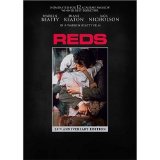Love stories don’t rank well on my list of preferred movies. When you get right down to it, though, one of my favorite movies — Reds — is just that, a love story, albeit one played out on an epic background. It’s the background that gets me.
 Written, produced and directed by its star, Warren Beatty, Reds tells the story of John “Jack” Reed, best known in the U.S. as the author of Ten Days That Shook the World, his firsthand account of the 1917 Russian Revolution. Clocking in at well over three hours, radical American politics and the Russian Revolution are the stage on which Beatty tells the story of Reed and his wife, Louise Bryant. Beatty infuses the film with history not just with the story and setting but by interspersing snippets of interviews with Reed’s and Bryant’s contemporaries. While I love the historic elements of the movie, it makes Reed and Bryant characters the audience can care about.
Written, produced and directed by its star, Warren Beatty, Reds tells the story of John “Jack” Reed, best known in the U.S. as the author of Ten Days That Shook the World, his firsthand account of the 1917 Russian Revolution. Clocking in at well over three hours, radical American politics and the Russian Revolution are the stage on which Beatty tells the story of Reed and his wife, Louise Bryant. Beatty infuses the film with history not just with the story and setting but by interspersing snippets of interviews with Reed’s and Bryant’s contemporaries. While I love the historic elements of the movie, it makes Reed and Bryant characters the audience can care about.
Released in 1981, the movie got 12 Academy Award nominationss, including best picture, best actor (Beatty), best actress (Keaton), best supporting actor (Jack Nicholson) and best supporting actress (Jean Stapleton). Of those five nominations, Stapleton was the only winner, deservedly earned for her portrayal of Emma Goldman. Beatty won the best director Oscar, though. Rotten Tomatoes gives the movie a 94 percent rating, saying that, “as it continues to age, the film only continues to grow in relevance, assuring its rightful place at the top of the Hollywood canon.”
As noted, I love the history aspect. Moreover, not only does Beatty portray that history in the epic cinema format many of the scenes dealing with the revolution and its aftermath invoke the larger than life approach Soviet filmmakers used in their own movies of Revolution. Beatty also does a fine job portraying the earnest idealism of Reed, a journalist who would actually end up being buried in the Kremlin Wall in recognition of his contributions to the Soviet state. But the real star of the film is Keaton.
Keaton certainly wasn’t a newcomer. After all, Annie Hall, several other Woody Allen movies and the first two Godfather movies (the only two worth watching) all preceded Reds. But Keaton rises to another level here. Her Bryant is mercurial and fiercely independent but also matures over the course of the movie, perhaps being even more of a realist than Reed. This could well be Keaton’s finest performance.
The movie, which was not released on DVD until 2006, does not glorify Reed or the Bolsheviks. In fact, the Bolsheviks come across as having more interest in the power of the state than the individual and straying from the dream of the workers’ collective. In fact, even Emma Goldman — whom the U.S. deported to Russia — wants to leave Russia because she sees this becoming another repressive government. As a NYT film critic wrote at the time the film was released, “‘Reds’ is not about Communism, but about a particular era, and a particularly moving kind of American optimism that had its roots in the 19th century.”
It is an optimism that now seems almost naive: the formation of Socialist and Communist parties in the American political system, expressing a desire to unite the working class and elevate perceived social good over capitalism. Yet another part rings all too true. Americans are great at talking about change. Actually working to bring it about is another thing altogether. Beatty’s Reed is willing to do that work and advocate that agenda internationally. Perhaps that’s why the Reed-Bryant relationship is the focus of the movie. After all, why would any red-blooded moviegoer fork over good money to see a story about an American who is, horror of horrors, a Communist?
I think voting is the opium of the masses in this country. Every four years you deaden the pain.
Emma Goldman (Jean Stapleton), Reds







